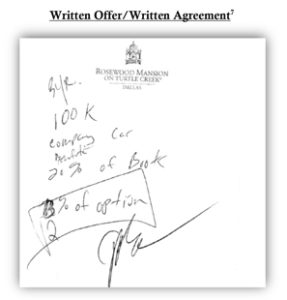(Aug. 21) – The digital age has opened the door for all kinds of things to constitute as evidence, but a business deal signed the old-fashioned way – on a cocktail napkin – scored a win for Dallas attorney Brian Hail over the weekend.

Hail represents Jonathan Kolniak, who was set to face off with his former employer, Bridger Logistics, in a jury trial this week in Dallas District Judge Martin Hoffman’s court. Kolniak claimed he had an agreement with the owner of Bridger at the time, James Ballengee, for a 2 percent equity interest in Bridger, which was sold to Ferrellgas Partners in 2015 for approximately $820 million.
Instead, Hail and his opposing counsel, Rob Bogdanowicz of Calhoun, Bhella, Seachrest and Charles Sartain of Gray Reed & McGraw reached a settlement agreement Saturday at 4 p.m.
“You never know when a case is going to settle,” Hail, a director at Kane Russell Coleman & Logan told The Texas Lawbook. “Some that shouldn’t settle do, and some that should settle don’t. The reality is… once you start trial, it’s harder to settle.”
The case settled for $1 million, which the defendants agreed to pay Kolniak in the next 60 days.
Bogdanowicz, who represents Ballengee and his company, Jamex (previously Bridger Group before the Ferrellgas deal), did not immediately respond to a request for comment.
The parties agreed that Bridger will pay Kolniak $150,000 while Ballengee and Jamex will pay Kolniak the remaining $850,000.
“The dispute was always between Mr. Kolniak and Mr. Ballengee and Bridger was pleased to contribute less than it would have cost to try the case to get rid of the distraction,” Sartain, who represents Bridger, said in an email.
In the summer of 2012, Ballengee and another Bridger executive met with Kolniak at Dallas’ Rosewood Mansion on Turtle Creek hotel, where Ballengee offered Kolniak a job, court documents say. Ballengee signed a cocktail napkin that laid out the terms of the three-year term employment agreement, which included a $100,000 base salary, a company car, full benefits, 20 percent commission on sales and a 2 percent equity interest in Bridger Logistics, Kolniak’s third amended petition says.

Kolniak accepted the job and began working at Bridger in September 2012. He claimed in his lawsuit that the 2 percent equity interest was a primary reason he accepted the job with Bridger – for which he relocated his family to Dallas from Louisiana.
Kolnaik said in his lawsuit that his 2 percent interest in Bridger was reaffirmed in August 2013, after private equity firm Riverstone invested $100 million in Bridger. Ballengee approached Kolniak about buying out his 2 percent through a text message. According to court documents, the two agreed that Ballengee would pay Kolniak $2 million over 10 years at $200,000 a year, effective in 2013.
“You have 2% as promised,” one message from the text message thread said (which was also admitted as evidence).
In May 2015, Ferrellgas Partners agreed to purchase Bridger Logistics for $820 million, and while “the sale sought to transfer all ownership of Bridger Logistics to FGP, Kolniak received no payment for his 2% equity interest because Jamex and Ballengee continued to falsely represent to Kolniak that they had already agreed to buy back his 2% equity for $2 million,” court documents say.
Kolniak got a lawyer involved in the fall of 2015, after the payment schedule never materialized, since “Ballengee continually insisted that the money as tied up (either in capital calls or because of the IRS), but would be paid when feasible,” the lawsuit says.
Kolniak’s lawyer, transactional attorney Jim Stanford of Byrd Adatto, reached an agreement with Jamex in which it would pay Kolniak the outstanding $1.6 million. But after Kolniak signed the agreement, Jamex never executed it, stating “there was never a meeting of the minds between the parties” therefore there was “no binding agreement.”
Kolniak filed suit as a result, arguing it was ridiculous that Ballengee determined they “never had any kind of deal despite the text messages and despite what the document said,” Hail said.
“You can see in the text messages [where Ballengee basically says] ‘Hey I’m going to take care of you…’ when it became evident that 2 percent was worth more than what he had anticipated, it became a little more uncertain,” Hail said.
“If all you had was… the cocktail napkin and text messages, you could basically win your whole case on that,” Hail said.
“I’m glad my client held on to it,” Hail said. “Sometimes you don’t hang onto those things.”
Hail said he got involved in the case because his daughter and Kolniak’s daughter are the same age and the families “have a lot of mutual friends.”
